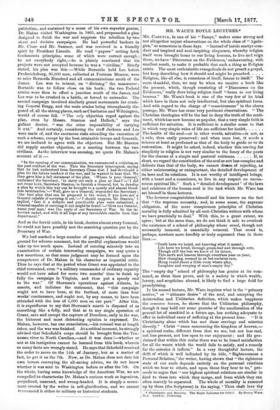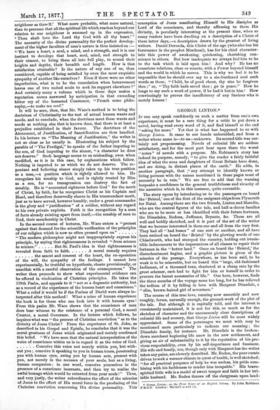MR. WACE'S BOYLE LECTURES.*
MR. CARLYLE, in one of his "Essays," makes some strong and not altogether unjust observations on the whole class of " Apolo- gies," so numerous in these days. "Instead of heroic martyr-con- duct and inspired and soul-inspiring eloquence, whereby religion itself were brought home to our living bosoms, to live and reign there, we have ' Discourses on the Evidences,' endeavouring, with smallest result, to make it probable that such a thing as Religion exists. The most enthusiastic evangelicals do not preach a gospel, but keep describing how it should and might be preached. . . . . Religion, like all else, is conscious of itself, listens to itself." The more thankful, then, we may be when we receive a book like the present, which, though consisting of "Discourses on the Evidences," really does bring religion itself "home to our living bosoms." Mr. Wace's book is one of the very few of its kind which have in them not only intellectual, but also spiritual force. And with regard to the charge of " consciousness" in the above passage, Mr. Wace has some very pertinent observations. "The Christian theologian will be the last to deny the truth of the senti- ment, which has now become so popular, that a very simple faith is sufficient for salvation. It is sufficient in a similar sense to that in which very simple rules of life are sufficient for health The health of the soul—or in other words, salvation—is not, as a rule, thus easily preserved ; and when once lost, it needs a science at least as profound as that of the body to guide us to its restoration. It might be asked, indeed, whether this craving for simplicity in religion is not very similar to the fancy of the poets for the charms of a simple and pastoral existence If, in short, we regard the constitution of the soul as not less complex and delicate than that of the body, we cannot dream of rejecting, as either uninteresting or unimportant, the detailed development of its laws and its relations. It is not worthy of intelligent beings, with a heart and a conscience, to live in any respect an uncon- scious spiritual life." Such a "detailed development" of the laws and relations of the human soul is the task which Mr. Wace has set himself in these lectures.
The lecturer congratulates himself and his hearers on the fact that "the supreme necessity, and, in some sense, the supreme obligation, of the more conspicuous principles of Christian morality is fully admitted by all anti-Christian writers with whom we have practically to deal." With this, to a great extent, we agree ; but at the same time, we do not think it safe to overlook the existence of a school of philosophy whose creed, though not necessarily immoral, is essentially unmoral. That creed is, perhaps, nowhere more forcibly or truly expressed than in these lines :—
" Death have we hated, not knowing what it meant ;
Life have we loved, through green-leaf and through sere, Though still the less we knew of its intent, This earth and heaven through countless year on year, Slow changing, seemed to us but curtains rare, Hung round about a little room where play,
Laughter and weeping of man's empty day."
The "empty day" school of philosophy has genius at its com- mand, as these lines prove, and in a society in which wealth, luxury, and scepticism abound, is likely to find a large field for proselytising.
In his second lecture, Mr. Wace inquires what is the "primary motive," or "ultimate desire" of the soul, and accepting the Aristotelian and Utilitarian definition, which makes happiness the summum bonurn, he shows that the Utilitarian philosophy, though it may hold out some promise of the amelioration of the general lot of mankind in a future age, has nothing adequate to offer in individual cases of suffering at the present time. "It is Christianity alone which has met these cravings and miseries directly." Christ "came announcing the kingdom of heaven,— a spiritual realm, different from that we see, but not less real, not less present, not less open to our enjoyment ; and He pro- claimed that within this realm there was to be found satisfaction for all the wants which the world fails to satisfy, and a remedy for the miseries it inflicts." In a very thoughtful lecture, the drift of which is well indicated by its title, "Righteousness a Personal Relation," the writer, having shown that "the righteous state of our souls depends entirely on the personal relations which we bear to others, and upon those they bear to us," pro- ceeds to argue that "our highest spiritual relations are similar in kind to those into which they merge, and from which they can often scarcely be separated. The whole of morality is summed up by them (the Scriptures) in the saying, 'Thou shalt love thy * Oaristiaoity and Morality. The Boyle Lectures for 1874-5. By Henry Waco, MA. London : Pickering.
neighbour as thpulf.' What more probable, what more natural, than to presume that all the spiritual life which reaches beyond our relation to our neighbour is summed up in the expression, Thou shalt love the Lord thy God with all thy heart." The necessity of the divine personality for the perfect develop- ment of the higher faculties of man's nature is thus insisted on :— "We have a heart, a soul, a mind, and a strength, and it is our instinct to develope that heart, soul, mind, and strength to their utmost, to bring them all into full play, to sound their heights and depths, their breadth and length. How is that satisfaction attainable? Is the nature of any one of us, thus considered, capable of being satisfied by even the most exquisite sympathy of another like ourselves? Even if there were no other imperfection, what is to be the consolation when bereavement leaves one of two united souls to seek its support elsewhere ?" And certainly many a volume which in these days makes a reputation seems answered by anticipation in that exceeding bitter cry of the bereaved Constance, "Preach some philo- sophy,—to make me mad."
It will be seen, then, that Mr. Wace's method is to bring the doctrines of Christianity to the test of actual human wants and needs, and to conclude, when the doctrines meet these wants and needs as nothing else that is known does, that there is at least a prejudice established in their favour. The doctrines of the Atonement, of Justification, of Sanctification are thus handled. In his lecture on "The Meaning of Justification," the writer is not so clear as he usually is. Illustrating his subject by the parable of "The Prodigal," he speaks of the father imputing to the son, of God imputing to the sinner, "a character he does not deserve." Such language seems to us misleading, even when modified, as it is in this case, by explanations which follow. Nothing is imputed to us which we do not deserve. The re- pentant and believing sinner simply takes up his true position as a man,—a position which is rightly allowed to him. He recognises his sonship to God, and is rightly treated by Him as a son, for no transgression can destroy the fact of sonship. He is "accounted righteous before God" for the merit of Christ, by faith, for he recognises Christ as his Captain and Head, and therefore deservedly shares in His transcendent merit, just as to have served, however humbly, under a great commander is the glory and " justification " of a soldier, without any regard to his own private exploits. Faith is the recognition by a man of facts already existing apart from itself,—the sonship of men to God, their membership in Christ.
In the second course of lectures, Mr. Wace enters a "protest against that demand for the scientific verification of the principles of our religion which is now so often pressed upon us." " The modern philosopher might not inappropriately express his principle, by saying that righteousness is revealed "from science to science." But St. Paul's idea is that righteousness is revealed from faith to faith A moral remedy requires the assent and consent of the heart, the co-operation of the will, the sympathy of the feelings. I cannot love experimentally, be truthful on hypothesis, chaste provisionally, or unselfish with a careful observation of the consequences." The writer then proceeds to show what experimental evidence can be offered in vindication of Christian principles. He takes the 139th Psalm, and appeals to it "not as a dogmatic authority, but, as a record of the experience of the human heart and conscience." What a relief it would be if the Psalms of David were always in- terpreted after this method ! What a mine of human experience the book is for those who can look into it with human eyes ! From this psalm Mr. Wace shows that the conscience of man does bear witness to the existence of a personal God, a moral Creator, a moral Governor. In the lecture which follows, he inquires what was "the process of Christian conviction" as to the divinity of Jesus Christ? From the experience of St. John, as described in his Gospel and Epistle, he concludes that it was the moral greatness of Jesus which originated and mainly confirmed this belief. "We have seen that the natural interpretation of the voice of conscience within us is to regard it as the voice of God.
' Conceive this voice not merely within yon, but with- out you ; conceive it speaking to you in human tones, penetrating you with human eyes, awing you by human acts, present with you, not merely in the recesses of your souls, but as a living, human companion ; in one word, conceive yourselves in the presence of a conscience incarnate, and then try to realise the awful homage which would be extorted from your souls !" Thus, and very justly, the writer subordinates the effect of the miracles of Jesus to the effect of His moral force in the producing of the Christian conviction concerning His divine personality. This
conception of Jesus manifesting Himself to His disciples as Lord of the conscience, and thereby affirming to them His divinity, is peculiarly interesting at the present time, when so many readers have been dwelling on a description of a Christ of these latter days,—a description drawn by the greatest of living writers. Daniel Deronda, this Christ of the age (who also has his forerunner in the prophet Mordecai), has for his chief character- istic this power of awakening, quickening, cherishing con- science in others. But how inadequate we always feel him to be to the task which is laid upon him ! And why ? He has no conscious relations, close or remote, with a Power beyond himself and the world in which he moves. This is why we feel it to be impossible that he should ever say to a sin-burdened soul such words as these, "Child, be of good cheer, thy sins be forgiven thee ;" or, "Thy faith hath saved thee ; go in peace." How he longs to say such a word of power, if he had it but in him ! How convincingly he proves the insufficiency of any Saviour who is merely human



































 Previous page
Previous page